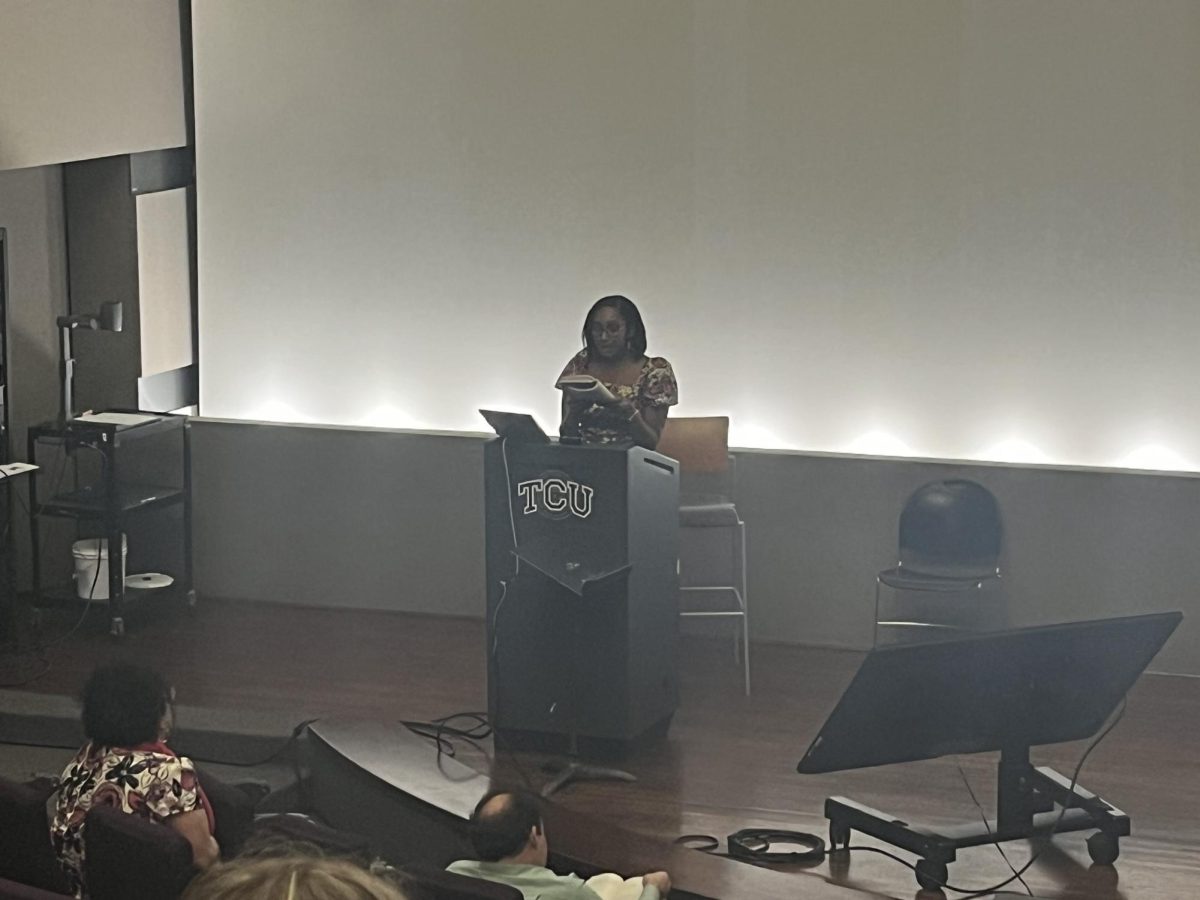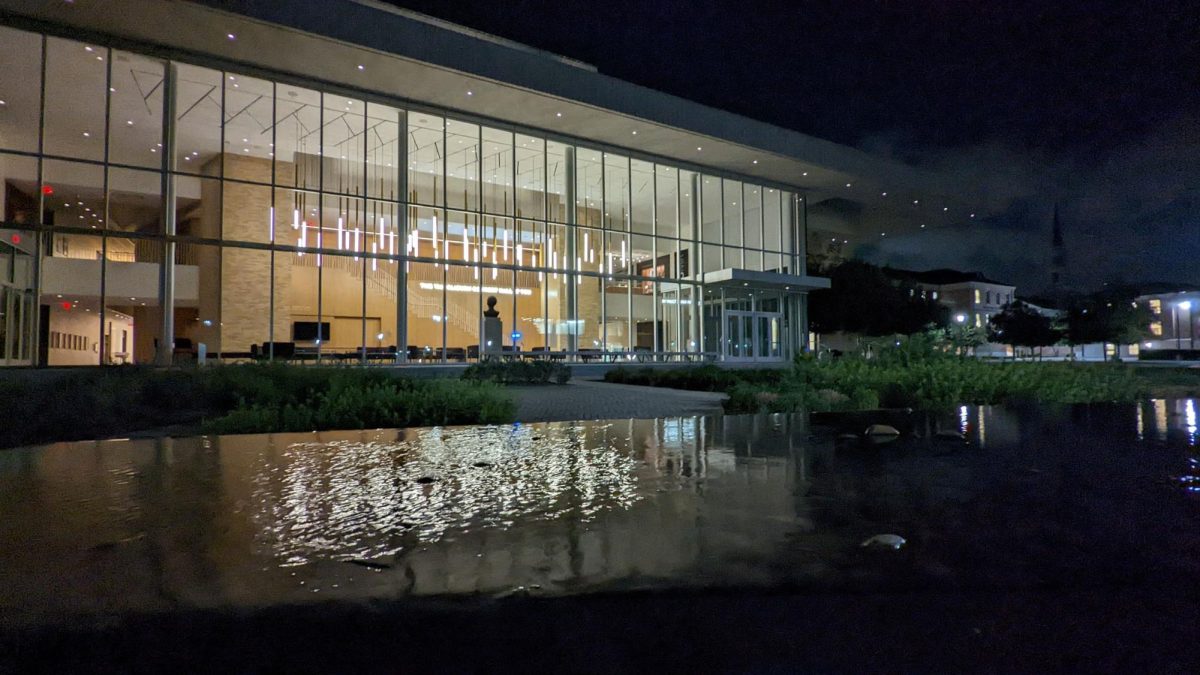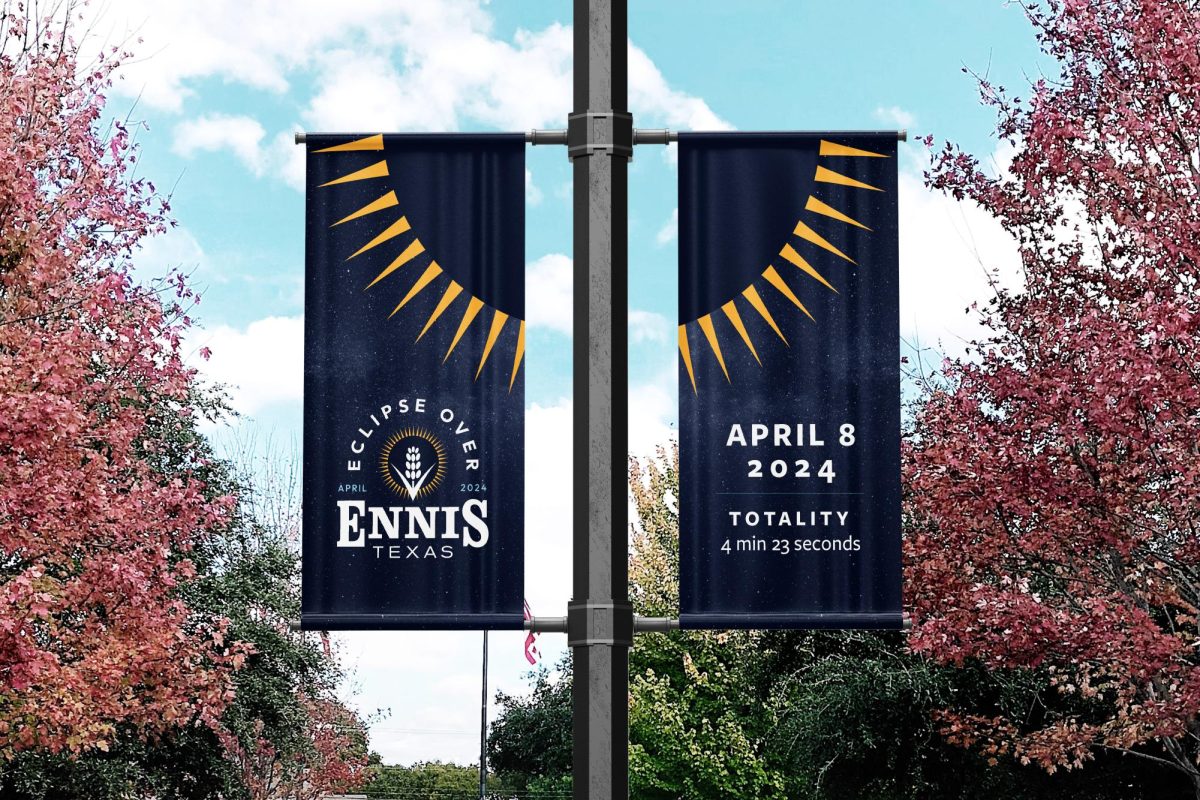Pastor Sean Reed closes his eyes and raises his hands to the heavens, lifting up songs of praise as he and four other church members lead worship. He claps joyfully at lyric breaks, swaying side to side and encouraging the congregation of about 120 people to join him.
As announcements are made and congregants find their seats, Reed asks that they mingle and greet each other. Church members hug and chat with visitors and regular attendees alike.
After greetings, Reed stands at the podium, making eye contact with the congregation and addressing them as if speaking to an old friend. He occasionally utilizes a deliberate hand motion or two to accentuate the point he was making. He speaks with conviction, always directing the message at the importance of maintaining one’s spiritual life. And yes, he’s still smiling.
The congregation is engaged in Reed’s message, regularly responding with an “amen” or “that’s right.”
Smiles, relationship and spirituality are all common aspects of a Sunday morning service at The Crossroads at 2701 West Berry St., a small, non-denominational church plant of which Reed is the head pastor.
Reed said this scene looked different six years ago when he and his wife, Lanette, planted the church in southwest Fort Worth, near Crowley. First of all, it has moved a few times since then, he said.
“We’ve moved around like the children of Israel, to seven new locations,” Reed said jokingly.
The 125 church members of today started out as five—Sean, Lanette and their three children, he said.
According to a research study by Ed Stetzer, a church planting researcher with the North American Mission Board, a church plant averages about 85 attendees after its first four years of operation.
Reed and Lanette, who is also the church’s co-pastor, said they had to make sacrifices from the beginning in order to increase membership.
They kept outgrowing their facilities, Reed said. Also, they had to stay in hotels between their moves to different facilities.
“Initially, to be honest, because we planted the church, the greatest difficulty was economically because (Lanette) and I carried the church financially,” Reed said.
“Every piece of equipment the church has, the church has built up to this point to have,” he said. “We’ve worked, and worked, and worked until we got to this point.”
“It’s always something new with a non-profit,” Reed said. “Counseling, studying, outreach, cleaning—there’s plenty of work to be done.”
That work, he said, included taking on tasks most pastors do not usually perform.
Wearing several hats
“Starting the church without many members made [Lanette] have to wear several hats,” Reed said, adding that his wife used to clean and set up chairs and he used to set up the sound system before and after each church service.
“For a long time, we were all the members, until God starting sending in the members,” he said. “Then, the weight, or what we call the stress of starting a church, began to lighten up a little bit.”
“It’s a big difference now,” he said. “It’s easier for us to focus on the preaching and teaching aspect as opposed to the mopping and sweeping.”
One thing Reed said was not an issue was choosing what kind of church Crossroads would be.
According to Ed Stetzer’s church planting study, 74 percent of church plants are completed with the help of a denominational adviser.
Reed said he and Lanette never associated themselves with a particular denomination.
“Sometimes denominations are beneficial in that it gives guests a ‘heads up’ on what to expect,” he said. “However, there are also negative stereotypes that are associated with them as well. Our hope is that people would come and experience our church culture to examine if it’s a great fit, that they’d judge us by our actions rather than a denominational creed.”
Shannon Cunningham, a church planting assistant at Southwestern Baptist Theological Seminary, said church planting is not for everyone.
He said as someone who has planted a church himself, a church planter must have a vision and be motivated, but also needs the support of a spouse and solid group of leadership.
Additionally, he said he usually tells church planters to raise about $36,000 a year, which should support a church planter’s family ministry. He said Southwestern has helped plant about 15 churches a year in conjunction with the North American Mission Board.
Much like Israel on its journey to the Promised Land, the couple also encountered significant trials and obstacles on their journey to what became their Promised Land: Fort Worth.
Music brought them together
From the beginning, the Reeds said, music ultimately brought them together and brought them to Fort Worth in 2001 as praise and worship pastors.
Originally from St. Louis, Mo., the couple said they were high school sweethearts who met when Lanette’s choir was practicing at Sean’s church in St. Louis. Reed said he noticed Lanette because she looked young for her age, she said she noticed him because he looked old for his age.
Either way, since that encounter at Reed’s church in St. Louis to when he began his music ministry, Reed said he has released five albums.
“I was a singer before I was a pastor,” he said. “Before any title, I’m a worshipper first. I was singing before I was every preaching.”
Their musical abilities also helped facilitate the church economically, Reed said.
“Originally, my wife and I owned a recording studio and that’s how we were able to maintain our ministry needs,” he said.
But between the early stages of their relationship and the present day, the couple has found itself in dire straits.
“My wife and I found ourselves giving away everything,” Reed said. “There were times we gave away all our clothes, there were times we gave our money, there were times we let people stay with us, there were times we fed the needy, there were times that things were tight, but we kept preaching and teaching just the same,” he said.
The struggles that have come in the couple’s journey from St. Louis to Fort Worth included what Lanette called the “Indianapolis short tour,” a six-month period of time that she said felt like a year.
In that six-month period, Lanette said, she hemorrhaged so much during one of her pregnancies that she miscarried. Also, two of the couple’s three children were placed in intensive care and their doctors were stumped on the next plan of action. What’s more, the Reeds had little-to-no money and were living in an apartment.
Turmoil, but happiness
“We went through so much turmoil, but in some ways, it was the happiest time that we’ve had,” Lanette said. “[That time] was teaching us how to be content, literally, in all things,” she said.
“God never wastes hurt,” Reed echoed. “We got affected in every way: physically, financially, relationally…but God brought us through it.”
Through all these experiences, Reed said, God showed the couple that they could not make it with their own qualities and abilities.
“One of the reasons we went through what we went through was because God closed every other option but him,” he said. “When we couldn’t look around — we had to look up.”
Through those experiences, Reed said, the couple has found its worth not in material objects, but family.
Cunningham said church plants often undergo a turnover in leadership after the first six months of operation. But the leadership team at Crossroads understands Reed’s vision.
LaShonda Meeks, a member of the church, said Reed’s ability to approach his obstacles with joy made him easy to relate to and encouraging when she met him in May 2008.
Meeks, also a St. Louis native, said she could relate to the Reeds’ experience in Indianapolis when she went through a divorce, lost her job and could not pay rent.
She said she met the Reeds with nothing but two boxes of toys and clothes, which were her son’s, and she found Crossroads, which changed her life.
Since she found the Reeds and their church, she said she learned similar lessons to those they learned during their time of struggle.
“I’ve grown just with my relationship with God and learning not to depend and rely on what’s going on with my circumstances, but go by what God is showing me,” she said.
“There have been many times I come in and talk to [Pastor Sean and Lanette]. Gosh, I talk to them too much,” she said. “They just know what’s going on with me and they ask—genuinely ask.”
Meeks said the couple will even watch her young son when she needs time to herself.
“Doing work with the ministry here, I’m walking out my purpose,” she said. “I’m doing stuff I never imagined I could do.”
Troy Klein said his experience was similar to that of Meeks. He said he met the Reeds in the midst of deciding whether he and his wife should get an abortion.
He said the Reeds helped him value his spiritual commitments and taught him the value of contributing to the church with tithes and offerings.
“Over time, I’ve learned the appreciation for God’s uniqueness and ability to show things,” he said. “I’ve learned to be able to deal with these things through my pastor and his guidance,” he said.
And Crossroads is more than a body of members, Klein said.
“It’s like a new family and a new appreciation and that uniqueness,” he said.
Family atmosphere
Pastor Sean attributes that family atmosphere to the growth that the church provides.
“We start off with an idea of what church is, and you come in and it’s a family,” he said. And eventually you’re going to get involved in the church in some kind of way.”
One of the most important manner by which he encourages Crossroads members to get involved is through humanitarian efforts and mission work.
“I have a passion for seeing our resources or our time and our talent being used to change the world,” he said.
As service comes to a close and the congregation slowly exits the sanctuary, Pastor Sean and Lanette know their job is not done yet. It’s clear they cannot completely let go of the days when they were sweeping and taking down sound equipment after services.
They stand at the church’s altar, awaiting the various prayer requests and needs the congregation present them. Klein, Meeks and other church members join in prayer, laying hands on the small group. Tears are shed. Hands are raised. And the pastors speak to each individual who was prayed for, smiling, excitement and hope in their eyes.
Reed refers back to this Sunday’s sermon titled, “I Know the Secret: Satisfied with Jesus.”
“Money will come, money will go. Clothes will come, styles will change. Houses get bigger and bigger and bigger, but nothing can do me like Jesus. Period.”





